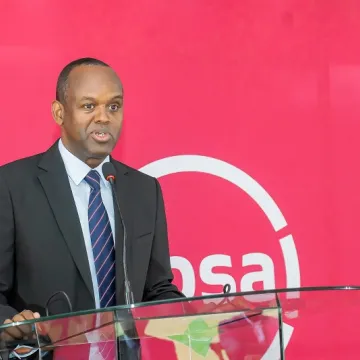Capital, conscience, the crisis of plastics and the role of finance in environmental stewardship

Charles Wokabi, Head of Sustainability, Communications and Corporate Affairs at Absa Bank Kenya PLC.
In 2017, Kenya made global headlines by enacting one of the world’s strictest bans on single-use plastic bags. It was a bold step signalling that we were not afraid to lead on issues of environmental governance. Three years later, the country extended this action to prohibit single-use plastics in protected areas like national parks, beaches, and forests. These were not just environmental gestures; they were policy signals that unsustainable consumption has consequences, and that protecting the environment must be woven into our national development agenda.
Yet even as regulation advances, the scale of the plastic crisis demands more than policy it calls for systemic change across every sector. The world now produces over 430 million tonnes of plastic each year, and two-thirds of it becomes waste within a short span. On the African continent, plastic waste is projected to triple by 2060 if current consumption and disposal patterns continue.
Financial institutions, often overlooked in environmental debates, play a pivotal role in this transition. Behind every plastic product is a value chain and behind that value chain is financing. Whether we choose to underwrite regenerative solutions or perpetuate extractive systems is now a defining question for our industry. According to UNEP, transitioning to sustainable materials and circular production will require over $4.5 trillion in global investment by 2050. Where capital flows, the future follows.
As a bank committed to shared prosperity, Absa Bank Kenya recognises that finance must be an engine for environmental restoration, not degradation. Our sustainability journey is rooted in the understanding that economic progress cannot come at the expense of ecological collapse.
We have taken deliberate steps to lead by example. Internally, we have eliminated single-use plastic bottles across our operations and installed water refill stations at our branches and offices. This year, we are scaling up our plastic recycling efforts with vendors, building on the over 200 kilograms recycled last year.
These may seem like small actions, but they are symbolic of a deeper shift in mindset. We have also embedded sustainability into our operations by integrating ESG risk factors into credit assessments, training suppliers on climate and governance standards, and holding ourselves accountable through board-level sustainability metrics.
But the real work lies not within our walls, but in how we deploy capital across the economy. We believe that finance must move from a transactional tool to a transformational force supporting inclusive enterprises, low-carbon technologies, circular value chains, and climate-resilient infrastructure.
Plastic pollution, in particular, demands this kind of financial leadership. It is a symptom of linear economic design where materials are extracted, used, and discarded without accountability. Ending plastic pollution will require financing innovation in product design, biodegradable alternatives, waste-to-value models, and new business practices. It will require challenging the assumption that convenience must come at a cost to the planet.
This is not just an environmental concern. It is a market risk, a governance issue, and a public health emergency. The economic cost of inaction is mounting from clogged urban infrastructure to declining tourism and fisheries, to rising cleanup costs. But it is also a missed opportunity to create green jobs, stimulate innovation, and lead Africa’s transition to a circular economy.
We are intentionally shifting our lens from growth at all costs to growth that regenerates. We are building a financing culture that is gender-inclusive, youth-conscious, community-centered and climate-smart. And we are partnering with stakeholders who share our conviction that environmental and economic value are not mutually exclusive but mutually reinforcing.
As the world observes World Environment Day 2025 under the banner “Putting an End to Plastic Pollution,” the message is clear, we are past the age of intention. This is the age of implementation. This phase demands that every actor public and private, financial and industrial pull in the same direction.
The task ahead of us is not just to clean up plastic. It is to reimagine our economic models, rewire our financing systems, and rethink what progress really means. Kenya has already shown the world what bold leadership looks like. Now, it is time to embed that same courage across the financial sector and into the very DNA of how we grow.
Because the future we fund is the future we inherit.
The author, Charles Wokabi, is the Head of Sustainability, Communications and Corporate Affairs at Absa Bank Kenya PLC.





